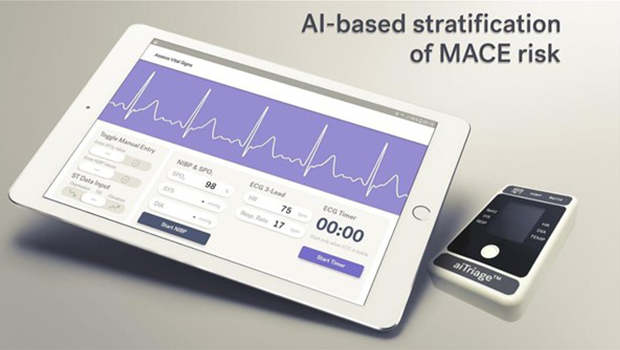SingHealth Institutions will NEVER ask you to transfer money over a call. If in doubt, call the 24/7 ScamShield helpline at 1799, or visit the ScamShield website at www.scamshield.gov.sg.
Clinical trial of Duke-NUS, SGH co-developed AI system underway following HSA approval

More than 70 people presenting at Singapore General Hospital’s emergency room with chest pain have been recruited to a new randomised controlled trial of a novel AI-based cardiac risk stratification tool that can rapidly and in real-time identify people whose chest pain is a sign of more serious trouble.
Co-developed by researchers and clinician-scientists from Duke-NUS and Singapore General Hospital and licensed to start-up TIIM Healthcare, aiTriageTM was approved as a Class C Medical Device by the Singapore Health Services Authority in November 2022. With that greenlight, it became one of only a few locally developed AI tools to be cleared for clinical use.
"With this trial, we want to prove the value of aiTriage and define the optimal use cases, so that it can shorten the time to diagnosis and treatment and save lives," said Professor Marcus Ong, director of Duke-NUS’ Health Services and Systems Research Programme and a senior consultant at Singapore General Hospital’s Emergency Department.
And it is not just high-risk patients who stand to benefit. The triage software can also accurately identify low-risk patients, who can then be discharged earlier.
The aiTriage impact
The idea for aiTriage stemmed from a need witnessed by Prof Ong in the emergency department (ED): each shift, he and his colleagues would see countless people with chest pain.
While chest pain can be triggered by life-threatening events like a myocardial infarction (colloquially referred to as a heart attack), it can also be the byproduct of conditions such as anxiety or panic attacks. Because there are no visible differences between the triggers, everyone has to be assessed, so that those who have a high risk of immediate cardiac complications are identified and treated.
"It is often only a small number of patients who require immediate and life-saving treatment," explained Prof Ong. "But because there is no way to tell them apart, everyone has to go through extensive diagnostic tests, which often translate into costly and prolonged stays in the ED."
To create a fast and objective scoring system, Prof Ong together with then-postdoctoral fellow Liu Nan, now an associate professor with Duke-NUS’ Health Services and Systems Research Programme and Centre for Quantitative Medicine, turned to technology.
"AI’s ability to detect subtle pattern changes for outcome prediction intrigued us and motivated us to apply it to address our clinical problem," said Assoc Prof Liu.
Their method integrates heart rate variability readings derived over five minutes of continuous ECG monitoring with a patient’s history, age and other risk factors to compute a risk score between 1 to 100.
"This score is derived by matching a patient’s data against a validated dataset within aiTriage," said Assoc Prof Liu. "And with additional cases, the AI algorithm will be further refined and updated."
In this way, the whole process from monitoring to triage decision is shortened to as little as six to seven minutes. For patients with a high-risk score that means faster treatment, while those whose risk is low have the standard eight-hour observation period cut to just two hours.
The trust factor
When Assoc Prof Liu first embarked on this project, he thought that success would be seeing aiTriage approved and in use.
"But I realised that the journey has only just begun," he said. "The ultimate goal is to overcome the barriers to adoption of this and similar tools, to get the healthcare community to trust well-built, robust AI tools."
And he is right to be concerned. While many papers describing novel AI tools have been published, few are being used in the clinic. And trends in the wider AI field point to similar barriers, including the recent call for a moratorium on the development of the most powerful AI systems following the rapid rise of chatbots like ChatGPT.
"In many cases, AI remains a black box. And in the healthcare space, we need to help build trust in these tools," said Assoc Prof Liu. "But that is going to take a long time."
The trial is one way the team hopes to help shift the needle. While they launched the trial at Singapore General Hospital in February, they plan to add more study sites, including Emergency Departments across Singapore and throughout Asia, to familiarise other healthcare professionals with the technology.
© 2025 SingHealth Group. All Rights Reserved.



















